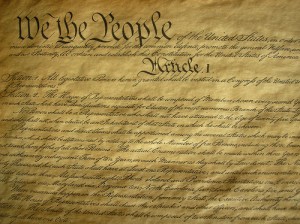Constitution 101
Constitution 101: Introduction

The Constitution of the United States has been in force longer than any similar instrument in the world. Yet our government often does not run as the Constitution says it should. The people can check that, but only if they know what the Constitution really says. CNAV today introduces this course to show what the Constitution really means.
The Constitution in history
The Constitutional Convention wrote the Constitution on September 17, 1787. This document went into force in 1788 after Virginia and New York ratified it.
The text of the Constitution gives four ways to change it. Congress can propose amendments directly (by two-thirds votes of both chambers) or call a convention when two-thirds of the States ask for one. Then the States may ratify the Constitution, either in their legislatures or in State conventions, whichever Congress decides. Congress has never called an amending convention. But Congress did send the Twenty-first Amendment to State conventions. (It has sent all other Amendments to State legislature.)
Twenty-seven Amendments are on file and in force. The first Ten Amendments (the Bill of Rights) all went into effect in one day (December 15, 1791). James Madison at first did not want to write certain rights into the Constitution and have anyone think that those were all the rights the people had. So when the people insisted, he wrote the Bill of Rights himself, and added two Amendments to address his concern. They were:
- The enumeration in this Constitution of certain rights shall not be construed to deny or disparage others retained by the people. (Amendment IX)
- Those powers not delegated to the United States by the Constitution, nor prohibited by it to the States, are reserved to the States respectively, or to the people. (Amendment X)
Informal amendments
The twenty-seven Amendments are the formal amendments. The Constitution has changed informally countless times. One of the oldest American civics textbooks, Magruder’s American Government (Pearson-Prentice Hall), lists five kinds of “informal amendments”:
- New federal laws
- Presidential decisions and actions
- Supreme Court cases
- Political party actions
- Custom
[ezadsense midpost]
These “informal amendments” stand for one reason only. The people have forgotten what the Constitution says. They trust their officials far too much. So when the President signs an Executive Order, the people think that Executive Orders have the force of law. When the Supreme Court disparages a right of the people, those same people say, “The Supreme Court says it, and that’s that.” In other words, the Constitution means whatever Congress, the President, or the Supreme Court say it means, any time they say it and can all agree on what to say. And when political parties dominate Congress and the legislatures, they, too, can change the government in ways the Framers never intended.
How to restore the Constitution
The United States government is not working the way the Framers meant it to work. Only the people can make it work properly again. To do that, they must learn anew how the government should work, according to the Constitution as the Framers wrote it, not as Congresses, Presidents, Supreme Courts, parties, and blind followers of custom have changed it.
[ezadsense leadout]
Terry A. Hurlbut has been a student of politics, philosophy, and science for more than 35 years. He is a graduate of Yale College and has served as a physician-level laboratory administrator in a 250-bed community hospital. He also is a serious student of the Bible, is conversant in its two primary original languages, and has followed the creation-science movement closely since 1993.

-

 Executive4 days ago
Executive4 days agoSecret Service chief gets no solace
-

 Executive3 days ago
Executive3 days agoWaste of the Day: Louisville Taxpayers Pay Nearly $600,000 For Empty Building’s Maintenance, Security
-

 Guest Columns4 days ago
Guest Columns4 days agoFear Itself: Democrats’ Favorite Strategy Caused Their Current Chaos
-

 Executive3 days ago
Executive3 days agoWhere is Joe Biden – or Jill?
-

 Executive1 day ago
Executive1 day agoWaste of the Day: Throwback Thursday: Cities Used Crime Prevention Funds on Soccer Games, Paper Shredding
-

 Executive2 days ago
Executive2 days agoFacile and politically motivated suggestions
-

 Civilization5 days ago
Civilization5 days agoBuild Iron Dome in the United States To Prepare for Israel’s Worst Day
-

 Executive1 day ago
Executive1 day agoBiden makes farewell whisper















I have to disagree with you Terry. The framers, while great in their vision, were men. They are not gods, and ultimately, they are not special. The constitution was written vague, probably in part so that it could be reinterpreted as time went on. In fact, the supreme court was given the right to reinterpret the constitution when ruling.
It is important to remember that we no longer live in the 18th century. It is important that our constitution reflects our 21st century values.
In other words, “the Constitution means whatever the Supreme Court says it means, any time it says it.” That would make our system a government of men, not a government of laws. Your fate would then depend entirely, not on what you did or did not do, but on whom you did or did not know.
“That would make our system a government of men, not a government of laws.”
As laws are written by men, there’s ultimately no avoiding that fact.
People look at me like I am a crazy fanatic when I say there is Zero Constitutional authority for Executive Orders. When I tell them to find one the go to wilckapdia or some other google site and give that pathetic reason but refuse to look in the Constitution for themselves. There really is Zero authorization for Executive Orders, actions or signing statement… also Zero authorization for the Supreme court to change a law.
I strongly disagree with you. There is nothing vague in the Constitution elijawa. Politicians and lawyers call it vague because they can’t find what they want to the “interpret” it into the Constitution. For instance, there is Zero authorization for the President to make law (Executive Orders)… Zero. The Constitution is not vague about that. The very first word in the body of the Constitution after the Preamble is the word “All”. All legislative power is vested in Congress. That is very specific… it is enumerated in the Constitution that only Congress gets to make law or change law… not the President and not the Supreme Court.
Actualy Ferguson, you are wrong. Yes, we have a government of men and women… who are bound by law to follow the law, the Constitution of the United States of America. They violate it and we the people (well, some of us) allow it by not being informed of what our Constitution does and does not allow those men and women who are supposed to be representing us can and can NOT do. When we get back to being a nation of Laws and not me is when America will be great again. The federal Government has one job only and that is to defend our natural rights…. they have failed because they have decided they are not bound by the supreme law of the land… and we have let them.